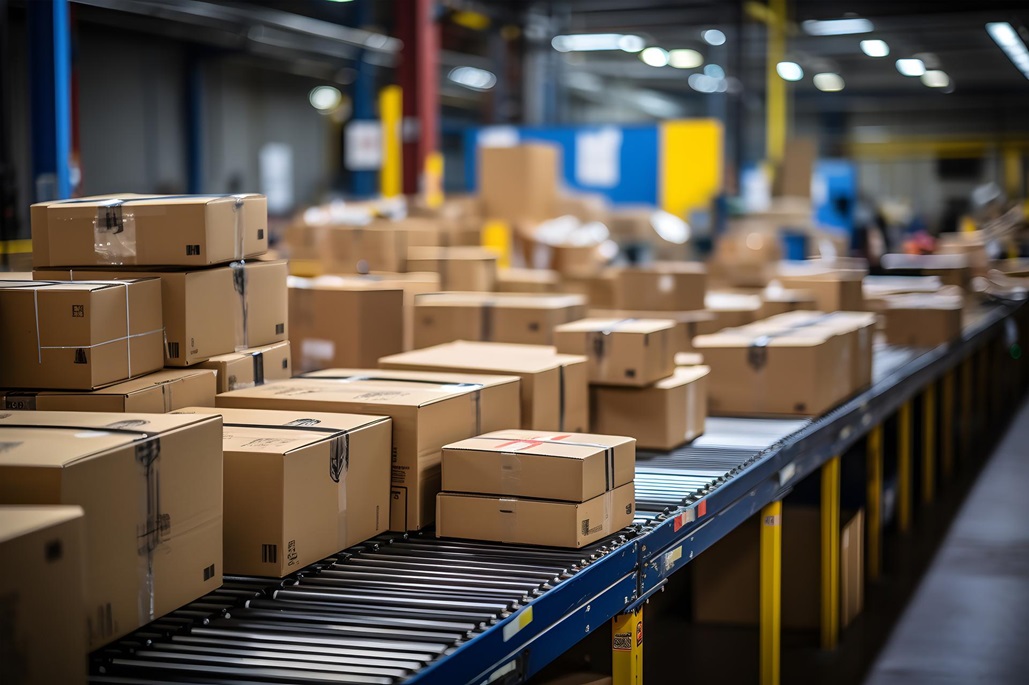The Role of Technology in Modern Ecommerce Fulfillment
In the rapidly evolving world of ecommerce, staying competitive requires more than just a user-friendly website and a robust marketing strategy. The backbone of a successful ecommerce business lies in its ability to fulfill orders efficiently and accurately. This is where technology steps in, revolutionizing ecommerce order fulfillment and making processes faster, more reliable, and more scalable.

The Importance of Ecommerce Order Fulfillment
Ecommerce order fulfillment is a comprehensive process that begins the moment a customer places an order and concludes when the product is delivered to their doorstep. This essential phase encompasses several key components, including inventory management, order processing, picking, packing, shipping, and handling returns.
Inventory management is the foundation of efficient ecommerce fulfillment. It ensures that the right products are available when customers place their orders. This involves tracking stock levels, managing warehouse space, and forecasting demand to avoid the pitfalls of stockouts or overstocking. Accurate inventory management is critical for preventing delays and ensuring that popular items are always in stock, which enhances customer satisfaction.
Order processing follows, where the details of the customer’s order are verified, payment is confirmed, and product availability is checked. This step ensures that orders are processed quickly and accurately, reducing the time between order placement and shipment. Efficient order processing is crucial for faster delivery times and a better overall customer experience.
Picking and packing are the next stages in the fulfillment process. Picking involves retrieving the ordered items from the warehouse, and packing ensures that these items are securely packaged for shipment. Accuracy in picking and careful packing are vital to prevent shipping errors and damage during transit. The condition in which the customer receives their order is directly affected by these steps, making them crucial for maintaining a positive customer experience.
Shipping is the final step in the fulfillment process, where the orders are handed over to carriers for delivery to customers. Offering timely and cost-effective shipping options is essential for meeting customer expectations. Providing tracking information allows customers to monitor their shipments, enhancing transparency and trust in the ecommerce business.
Handling returns efficiently is also a critical part of ecommerce fulfillment. It involves processing returned items, issuing refunds or exchanges promptly, and updating inventory records. A smooth returns process is vital for customer satisfaction, as it assures customers that they can return products hassle-free if they are not satisfied with their purchase.
Efficient ecommerce fulfillment is vital for maintaining customer satisfaction and loyalty because it directly impacts delivery times, the accuracy of orders, and the overall customer experience. Fast and reliable delivery times meet customer expectations and enhance the shopping experience, encouraging repeat business. Ensuring order accuracy builds trust and reliability, reinforcing customer confidence in the brand. Overall, the fulfillment process plays a significant role in shaping the customer experience. From order placement to delivery and potential returns, each touchpoint affects how customers perceive the brand. A seamless and efficient fulfillment process contributes to a positive shopping experience, fostering customer loyalty and encouraging word-of-mouth referrals. Thus, optimizing each stage of the fulfillment process is essential for ecommerce businesses to ensure that customers receive their orders quickly and accurately, leading to higher levels of satisfaction and positive brand reputation.
Technological Advancements in Ecommerce Fulfillment
The advent of advanced technologies has transformed ecommerce fulfillment, making it more efficient and customer-centric. Here are some of the key technological advancements driving this transformation:
Automation and Robotics
- Automated Warehouses: Automated storage and retrieval systems (AS/RS) increase efficiency by reducing the time it takes to pick and pack orders.
- Robotic Process Automation (RPA): Robots handle repetitive tasks such as sorting and packing, which speeds up the fulfillment process and reduces human error.
- Drones and Autonomous Vehicles: Emerging technologies like drones and self-driving vehicles are being tested for faster and more flexible delivery solutions.
Advanced Software Solutions
- Warehouse Management Systems (WMS): These systems offer real-time inventory tracking, automated reordering, and efficient space utilization.
- Order Management Systems (OMS): OMS integrate with various sales channels to consolidate orders and ensure smooth processing and fulfillment.
- Customer Relationship Management (CRM): CRM systems help manage customer interactions, track order histories, and enhance personalized service.
Data Analytics and Artificial Intelligence
- Predictive Analytics: Analyzing customer data to forecast demand, optimize inventory levels, and reduce stockouts or overstock situations.
- AI-Powered Customer Support: Chatbots and virtual assistants provide instant responses to customer inquiries, enhancing the shopping experience.
- Personalization Algorithms: Leveraging AI to recommend products based on customer behavior and preferences, increasing sales and customer satisfaction.
Internet of Things (IoT)
- Smart Warehouses: IoT devices monitor conditions within the warehouse, such as temperature and humidity, ensuring optimal storage conditions for various products.
- Tracking and Monitoring: IoT-enabled tracking devices provide real-time updates on the status and location of shipments, enhancing transparency and trust.
Benefits of Integrating Technology in Ecommerce Fulfillment
The integration of technology in ecommerce fulfillment offers numerous benefits that enhance efficiency, accuracy, and customer satisfaction.
Increased Efficiency
- Automation: Automation reduces the time and labor required for various fulfillment tasks, speeding up the overall process.
- Streamlined Operations: Advanced software solutions streamline operations by automating order processing, inventory management, and other critical tasks.
Enhanced Accuracy
- Error Reduction: Technologies like barcode scanning and RFID tagging minimize errors in inventory management and order fulfillment.
- Precision in Picking and Packing: Automated systems ensure that the correct products are picked and packed accurately, reducing the risk of incorrect orders.
Cost Savings
- Labor Savings: Automation and robotics reduce the need for manual labor, leading to significant cost savings.
- Optimized Inventory Management: Predictive analytics and real-time inventory tracking help businesses maintain optimal stock levels, reducing carrying costs and minimizing waste.
Improved Customer Experience
- Faster Delivery: Automation and advanced logistics solutions enable faster order processing and shipping, leading to quicker delivery times.
- Better Communication: AI-powered customer support and real-time tracking provide customers with timely updates and assistance, enhancing their overall experience.
- Personalized Service: Personalization algorithms and CRM systems enable businesses to offer tailored recommendations and promotions, increasing customer satisfaction and loyalty.
Scalability
- Handling Increased Order Volumes: Technology allows businesses to scale their operations seamlessly, handling higher order volumes without compromising on quality or speed.
- Adapting to Market Changes: Advanced analytics and AI enable businesses to quickly adapt to changes in demand and market conditions, ensuring they remain competitive.
Conclusion
The role of technology in modern ecommerce fulfillment cannot be overstated. From automation and robotics to advanced software solutions and IoT, these technologies are revolutionizing how ecommerce businesses operate, making them more efficient, accurate, and customer-centric. As technology continues to evolve, so too will the capabilities and expectations of ecommerce order fulfillment, driving the industry forward into a new era of innovation and growth. Embracing these advancements is not just an option but a necessity for any ecommerce business aiming to thrive in today’s competitive market.
Frequently Asked Questions
Ecommerce fulfillment is the process of handling orders from when a customer places them until they are delivered. It includes inventory management, order processing, picking, packing, shipping, and handling returns. Efficient ecommerce fulfillment ensures timely and accurate delivery, which is crucial for maintaining customer satisfaction and loyalty. A smooth fulfillment process can enhance the shopping experience, encouraging repeat business and positive word-of-mouth referrals.
Technology enhances ecommerce fulfillment by automating tasks, improving accuracy, and streamlining operations. Automated warehouses and robotic process automation speed up picking and packing, reducing human errors. Advanced software solutions, like warehouse management systems, optimize inventory management and order processing. The use of data analytics and IoT devices allows for real-time tracking and monitoring, leading to faster deliveries and better customer satisfaction.
Automated warehouses use technology like Automated Storage and Retrieval Systems (AS/RS) to handle inventory efficiently. They reduce the time required for picking and packing orders, increasing overall fulfillment speed. This leads to faster delivery times and improved customer satisfaction. By minimizing manual labor and reducing errors, automated warehouses lower operational costs and enhance the accuracy of order fulfillment, making them a valuable asset for any ecommerce storefront.
Advanced software, such as warehouse management systems (WMS) and order management systems (OMS), plays a crucial role in ecommerce fulfillment. WMS provides real-time inventory tracking, optimizing storage and reducing stockouts. OMS integrates multiple sales channels, ensuring smooth order processing and fulfillment. These systems streamline operations, reduce manual errors, and improve overall efficiency, leading to faster delivery times and better customer satisfaction for ecommerce storefronts.
Predictive analytics in ecommerce fulfillment involves analyzing customer data to forecast demand and optimize inventory management. It helps businesses anticipate trends, ensuring they maintain optimal stock levels to avoid stockouts or overstock situations. By leveraging data, predictive analytics enhances decision-making, reduces waste, and improves efficiency in the fulfillment process. This technology is vital for providing timely and accurate delivery, which boosts customer satisfaction and loyalty.
AI-powered customer support systems, like chatbots and virtual assistants, provide instant responses to customer inquiries. They improve the ecommerce experience by offering 24/7 support, resolving issues quickly, and providing personalized assistance. This technology enhances communication, builds customer trust, and ensures a seamless shopping experience. By automating support, businesses can handle a higher volume of inquiries efficiently, leading to better customer satisfaction and loyalty in ecommerce storefronts.
IoT devices in ecommerce fulfillment offer real-time monitoring and tracking of inventory and shipments. They ensure optimal storage conditions by monitoring temperature and humidity, improving product quality. IoT-enabled tracking devices provide customers with real-time updates on their orders, enhancing transparency and trust. This technology improves operational efficiency, reduces errors, and enables faster deliveries, leading to higher customer satisfaction and more reliable ecommerce fulfillment.
Technology reduces fulfillment costs by automating processes, minimizing labor, and optimizing inventory management. Automation decreases the need for manual labor in picking, packing, and shipping, leading to significant cost savings. Predictive analytics and real-time inventory tracking help maintain optimal stock levels, reducing carrying costs and minimizing waste. These advancements streamline operations and improve efficiency, allowing ecommerce businesses to offer competitive prices and better manage their fulfillment expenses.
Automation enhances accuracy in ecommerce fulfillment by reducing human error in order processing, picking, and packing. Technologies like barcode scanning and RFID tagging ensure precise inventory tracking and order handling. Automated systems ensure that the correct products are picked and packed accurately, reducing the likelihood of shipping incorrect items. This leads to fewer returns, improved customer satisfaction, and a more reliable fulfillment process, essential for maintaining a positive ecommerce storefront reputation.
Efficient handling of returns is crucial for ecommerce businesses because it affects customer satisfaction and loyalty. A smooth returns process allows customers to return products hassle-free, building trust and encouraging repeat business. It involves processing returns promptly, issuing refunds or exchanges, and updating inventory records accurately. Effective return management ensures that customers feel confident in their purchase decisions, leading to a better overall shopping experience and enhancing the reputation of the ecommerce storefront.
Get A Quote
"*" indicates required fields


